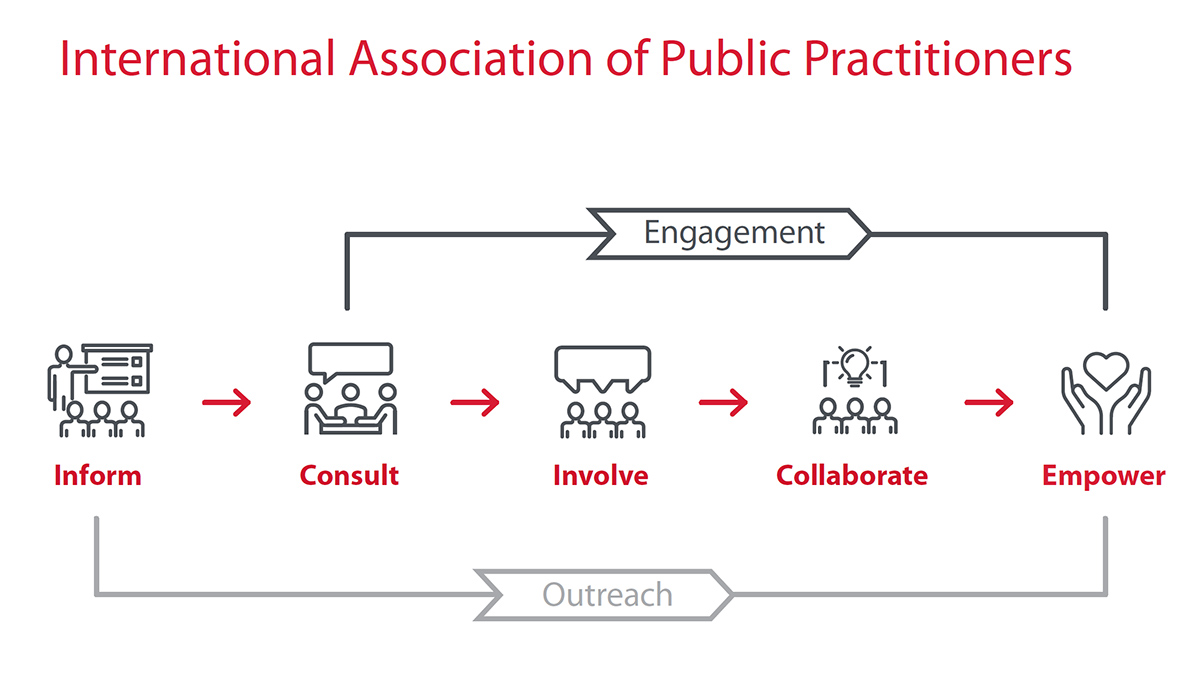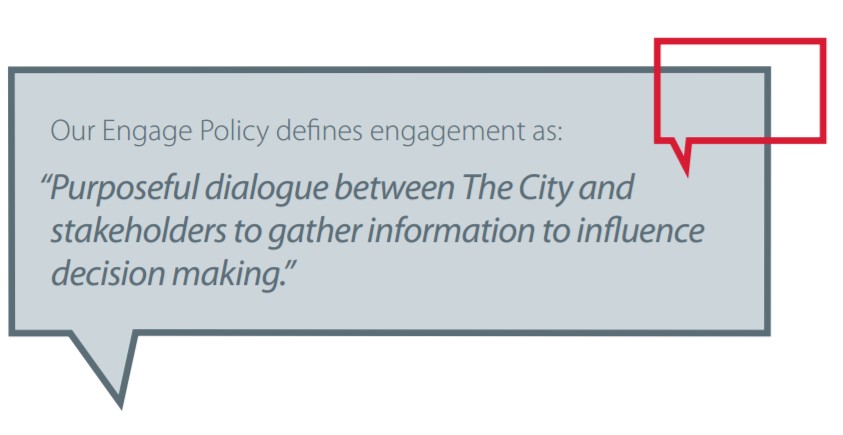Community outreach on Planning and Development
-
Outreach tools and resources for landowners and applicants
-
Outreach tools and resources for citizens
-
Who does what?
What is community outreach on Planning and Development all about?
We are connected to places where we live, work and spend our time – from our homes, to local shops, restaurants, schools and parks. The experiences we have within our city and communities are influenced in large part by the environment that we’ve built around us.
Perhaps we’d like things to stay just the way they are, but the reality is that communities and buildings have a lifecycle and the needs and preferences of people are always changing and evolving.
Community outreach is about reaching out and connecting with people to discuss change before it happens. Community outreach for planning and development is about reaching out to discuss specific development proposals or plans that outline where and how future growth and redevelopment can be accommodated within a specific area.
Experience has shown that the earlier in the process you consider and exercise your outreach options, the more likely it will be to contribute to successful outcomes. Outreach can help reduce conflict and eliminate surprises as potential risks or concerns can be identified sooner.
Discussing change isn’t always easy, but it is a critical component of building great communities and creating awesome places and spaces for us to live, work and enjoy.
Who is this toolkit for?
This toolkit is for anyone who is interested or involved in the community outreach process connected to the planning and development of Calgary and our communities. These tools and resources are here to help you – whether you’re a community member looking to get involved or someone with a new development idea that you’re looking to connect with the community about.
What is the purpose of this toolkit?
The aim of this toolkit to help people interested or involved in community outreach for planning (from builders, developers and landowners, to community members, business owners, community associations, City planners and Councillors) understand and be successful in their role. This toolkit includes information, tools and resources to:
- Clarify what community outreach is and who is responsible for what.
- Clarify when, where and how people can initiate and get involved in conversations about planning and development in Calgary.
- Improve understanding of City planning and development processes and tools.
- Help builders, developers and landowners with their community outreach efforts.
- Help citizens and community members as participants in community outreach.
Meaningful outreach is not as simple as a checklist or a one size fits all approach. This toolkit, information, tools and resources explain community outreach as it relates to planning and development in Calgary.
What is community outreach?
There is broad agreement across the globe that there are different levels of public participation or community outreach. The Spectrum of Public Participation created by the International Association of Public Practitioners (IAP2) shows different levels of public involvement.
Inform sits at one end of the spectrum (the focus is generally on one-way information sharing or communication) and empower sits at the other end of the spectrum (where the focus is generally on interested parties being empowered to make decisions independently).
Outreach is a term we use to describe all activities within the spectrum.

Community is intended to refer to a community of place (such as a specific geographic area or neighbourhood) or a community of interest (such as a community that shares a common passion or concern).
The City's Engage Policy

The City of Calgary (Council and Administration) recognizes that decisions are improved by engaging citizens and other interested parties where appropriate. Within The City’s ability to finance and resource, The City commits to conduct transparent and inclusive engagement processes that are responsive and accountable.
When The City undertakes formal engagement – in connection with City projects, programs, policies and initiatives – it is guided by the Engage Policy and Engage Framework.
The City’s Engage Policy defines engagement as “Purposeful dialogue between The City and interested parties to gather information to influence decision making”.
From a City perspective, engagement is about bringing interested or impacted people together to make better decisions.
Although we may wish that at the end of a project all participants will be happy with the outcome that is generally not realistic. The purpose of engagement is not to make everyone happy, it is to ensure that all voices are heard and considered when making decisions that impact others in an effort to make better decisions.
- It’s about discussing issues, opportunities, solutions, trade-offs, etc. and considering input before decisions are made.
- Engagement focuses on discussing things that have the ability to change.
- As key themes emerge, decision-makers must consider feedback and explain how they will incorporate feedback or if they cannot incorporate feedback, they should explain why (if not, why not?).
Not every decision is open for public input, that’s where the term outreach comes in. There is often a need to increase understanding, raise awareness or address concerns through outreach – both within an engagement process or even if formal engagement isn’t possible.
Outreach can happen in many forms. From simply sharing information, to two-way or multi-way dialogue all the way through to formal engagement. Outreach is a term that we use to summarize all forms of communication, relationship building and engagement.
What are the core principles of outreach?
The success of a development project is important to applicants. But it could also be important to the neighbours and community too. Providing information, connecting with those impacted by your project and working to understand their perspectives is beneficial.
In order to have a constructive and meaningful outreach process there first needs to be a shared understanding and commitment to the guiding principles related to whether you are leading an outreach process or getting involved in an outreach process. These principles should be upheld by all those involved to ensure a successful outreach process can be achieved.
Guiding principles for leading outreach:
- Be inclusive: Make a legitimate effort to notify the community of the opportunity to get involved. Ensure you are involving all of those who are impacted directly or indirectly.
- Be clear on scope: Be clear on what the influencing factors are and use this to define the scope of the conversation you are willing to have. This helps to guide the information that is shared and to define the questions within the process.
- Stay committed: Allocate sufficient resources for effective and authentic outreach.
- Provide transparent information: Provide honest, clear, timely and complete information.
- Hold respectful conversation: Listen to the entire spectrum of thoughts, insights and experiences as they relate to the process at hand. This means taking the time to answer questions, listen and ask questions of their own.
- Authentically listen: A commitment to authentically listen means that all feedback is considered equally, whether supportive of a project or not.
- Close the loop: Reporting is how the organizer of a process closes the loop with the community and the conversation that has taken place. The best reports share not only what was heard, but where the feedback influenced decision-making – and just as importantly – where the feedback didn’t influence decision-making, and why.
Guiding principles for participating in outreach:
- Be informed: During any planning process, there’s usually a wealth of information to draw from. It’s important for you to take the time to review the information at hand, so you are in a position to provide informed input.
- Get involved: Know the timelines and select the means of participation that meets your needs.
- Share your views: By sharing your views, you can help ensure all sides of an issue are reflected and considered.
- Listen to other viewpoints: It’s not uncommon for discussion on development to be polarizing. People often have differing opinions and a lack of trust in the process. The best processes involve learning for everyone who participates. The opportunity to learn from each other and hear the perspectives of others is a critical component of any outreach program. We don’t all have to agree on the issues, but we do need to agree to listen to each other.
- Be respectful: Regardless of our opinions or perspectives, we have a responsibility to treat each other with respect. Everyone should feel free to share their ideas, and no one should feel bullied or fearful about expressing their opinions.
*Note that the principles for conducting and participating in outreach have been adapted in part from Intelligent Futures: Threshold of Responsibility.


